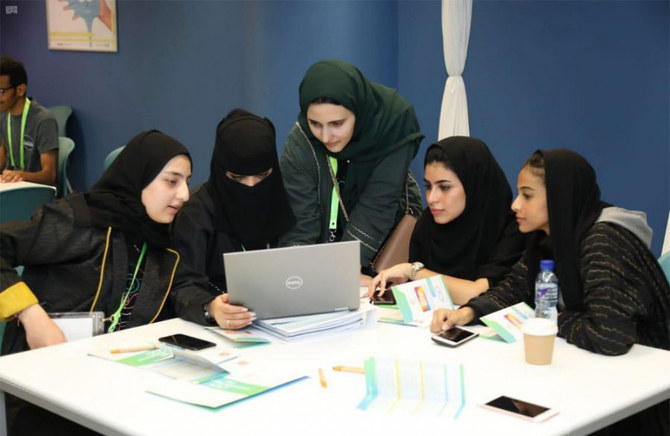
- ARAB NEWS
- 28 Apr 2024

JEDDAH: The days of male dominance in Saudi academia are numbered if the growing number of women pursuing postgraduate study and working as lecturers and professors at educational institutions across the Kingdom is any guide.
By removing barriers to study and work, and addressing inequalities in academia, doors have been opened wide for female empowerment in all sectors of the modern Saudi economy.
Educational reforms have passed through several stages over recent decades, including the introduction of government scholarships and Ministry of Education programs to encourage female students to study a range of in-demand and specialized subjects.
Although the first scholarship in the Kingdom’s history was introduced in 1935, when King Abdul Aziz sent three Saudi students to the UK, it was much later that Thoraya Obaid became the first Saudi woman to receive a government scholarship, graduating from Mills College in Oakland, California, in 1966.
Obaid went on to become one of 100 notable “Muslim Builders of World Civilization and Culture,” among many other remarkable achievements.
Many others soon followed in her footsteps. In 1980, the number of scholarships allowing young Saudis to study in the US grew rapidly. Of the 11,000 students granted scholarships during that period, a third of them were women.
With more female graduates came incremental improvements in the number of women entering top jobs and earning salaries on par with their male colleagues.
Further changes came after 2005 when King Abdullah announced a new program called “The Custodian of The Two Holy Mosques Scholarship,” designed to strengthen Saudi academic institutions and broaden their research and course offerings.
After King Salman came to the throne, the government’s scholarships program underwent further transformations to reflect the Kingdom’s Vision 2030 reform agenda, which sets out to diversify the Saudi economy away from oil to embrace high-tech, creative and other specialized industries.
These new scholarships have been designed to cover specific areas of study to allow young Saudis to participate in the Kingdom’s journey to become a global player in the modern globalized economy.
These changes also aim to link students’ qualifications with careers available in the Saudi job market, raising overall efficiency and developing managerial techniques.
Thanks to these schemes, Saudi women have forged ahead in all areas of academia, from administration and teaching to research.
“I’ve always been scholarly-minded; reading, writing and teaching,” Haya Zidan, vice dean for graduate studies and scientific research at Saudi Electronic University in Riyadh, told Arab News.
During her own studies, Zidan was granted a scholarship, which allowed her to study in the US and the UK, where she obtained degrees in health sciences, before returning to the Kingdom to work in academia.
“My first job was at the then-newly established Arab Open University in 2003, and since then I’ve worked at several universities and colleges, such as Dar Al-Hekma University, Princess Nourah Bint Abdulrahman University, the Saudi Electronic University, and Hamdan Bin Mohammed Smart University in Dubai,” she said.
For more than 15 years, Zidan has been teaching students online through e-learning platforms, which she believes is a superb tool that allow female students to attend lectures remotely.
“It is a special kind of joy to connect with students, sharing ideas and working through concepts, designing health interventions and research projects, and to witness how they grow and recognize their immense potential to be part of the sweeping changes in health care and society,” Zidan said.
The combination of scholarships, institutional growth and new technologies has revolutionized women’s education in Saudi Arabia, broadening horizons for millions of young people.
“We are always proud to see such successes. I am constantly amazed by the efforts women put forward in achieving targets and goals, both personal and professional, and the heart they put into everything they do, despite the challenges,” Zidan said.
“I also appreciate the power of mentorship from women who are more experienced for others who are just starting out, to support them in finding their footing and providing them with opportunities to shine too.
“We are also learning more from women’s power. It is a way to succeed and achieve goals as a collective, in line with the ambitions of Vision 2030.”